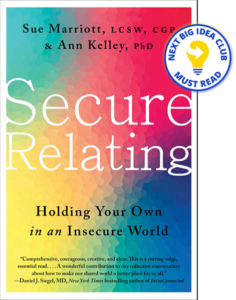Transform conflict into connection with ACT
Dr. Diana Hill and co-host Dr. Ann Kelley explore the power of process-based therapy to improve relationships and wellbeing. Through various methods like the 6 principles of ACT, the understanding of values, and the family body analogy, they use their personal and professional experience to discuss ways to help resolve conflict and find deeper connection through secure relating. Learn ways to tap into your most deeply connected self to move forward through life’s challenges and nurture healthy relationships.

“We don’t battle thoughts. We don’t challenge thoughts. We just let thoughts go, and we can act independently from our thoughts.” – Dr. Diana Hill
Time Stamps for ACT
1:06 – What is ACT?
8:52 – Introduction to cognitive diffusion
10:45 – Exploring the transcendent self and family body analogy of ACT
12:09 – The six processes of ACT
20:54 – Utilizing Diana’s daily journal book method
26:53 – Navigating experiential avoidance
33:57 – Moving through acceptance
50:52 – How to learn more about the ACT principles
About our Guest – Dr. Diana Hill
 Diana Hill, PhD, is a clinical psychologist, and co-author of ACT Daily Commitment Therapy Journal: Get unstuck and live full with Acceptance. She is also a co-host of the popular podcast, Psychologists Off the Clock which has over 1 million downloads, where she has interviewed leaders in the field of psychology, mindfulness, and wellness including Dr. Daniel Goleman, Dr. Rich Hanson, The Psychology of Radical Healing Collective, Dr. Daniel Siegel, and Dr. David Sinclair. She is a regular teacher for the Mindful Hearts Program and Insight LA. Through her online teachings, executive coaching, clinical supervision, and private therapy practice Diana encourages clients to build psychological flexibility so that they can live more meaningful and fulfilling lives.
Diana Hill, PhD, is a clinical psychologist, and co-author of ACT Daily Commitment Therapy Journal: Get unstuck and live full with Acceptance. She is also a co-host of the popular podcast, Psychologists Off the Clock which has over 1 million downloads, where she has interviewed leaders in the field of psychology, mindfulness, and wellness including Dr. Daniel Goleman, Dr. Rich Hanson, The Psychology of Radical Healing Collective, Dr. Daniel Siegel, and Dr. David Sinclair. She is a regular teacher for the Mindful Hearts Program and Insight LA. Through her online teachings, executive coaching, clinical supervision, and private therapy practice Diana encourages clients to build psychological flexibility so that they can live more meaningful and fulfilling lives.
Resources for ACT
Dr. Diana Hill – Website & resources
ACT Daily Journal & Card Deck – Dr. Hill’s daily journal book
Psychologists Off the Clock – Dr. Diana Hill’s podcast
The Power of Regret by Daniel Pink – Referenced by Diana Hill when discussing values
And of course, our book is also a great resource – it’s for professionals and life-long learners of all kinds. If you’ve read it we’d love to hear from you and if you support it, PLEASE leave a review on either Amazon or Goodreads. Tk you!!

Events, Announcements & Resource Links for Secure Relating & the Election

Trauma Therapy Directory – Resources for Trauma, PTSD, and Complex PTSD – Created by our friends at the Trauma Therapy Network!
Our Sponsors for this Episode –

Go to ZocDoc.com/TU
Compare high quality, in-network doctors, choose the right one for your needs, and click to instantly book an appointment.

Become the best version of yourself and get 15% off Ned products with code TU.

Our favorite skin quencher. Get 15% off OneSkin with the code TU at https://www.oneskin.co/ #oneskinpod
Thanks for listening, friends, & for being on this journey with us!

 Therapist Uncensored Podcast
Therapist Uncensored Podcast 







 Diana Hill, PhD, is a clinical psychologist, and co-author of ACT Daily Commitment Therapy Journal: Get unstuck and live full with Acceptance. She is also a co-host of the popular podcast, Psychologists Off the Clock which has over 1 million downloads, where she has interviewed leaders in the field of psychology, mindfulness, and wellness including Dr. Daniel Goleman, Dr. Rich Hanson, The Psychology of Radical Healing Collective, Dr. Daniel Siegel, and Dr. David Sinclair. She is a regular teacher for the Mindful Hearts Program and Insight LA. Through her online teachings, executive coaching, clinical supervision, and private therapy practice Diana encourages clients to build psychological flexibility so that they can live more meaningful and fulfilling lives.
Diana Hill, PhD, is a clinical psychologist, and co-author of ACT Daily Commitment Therapy Journal: Get unstuck and live full with Acceptance. She is also a co-host of the popular podcast, Psychologists Off the Clock which has over 1 million downloads, where she has interviewed leaders in the field of psychology, mindfulness, and wellness including Dr. Daniel Goleman, Dr. Rich Hanson, The Psychology of Radical Healing Collective, Dr. Daniel Siegel, and Dr. David Sinclair. She is a regular teacher for the Mindful Hearts Program and Insight LA. Through her online teachings, executive coaching, clinical supervision, and private therapy practice Diana encourages clients to build psychological flexibility so that they can live more meaningful and fulfilling lives.



